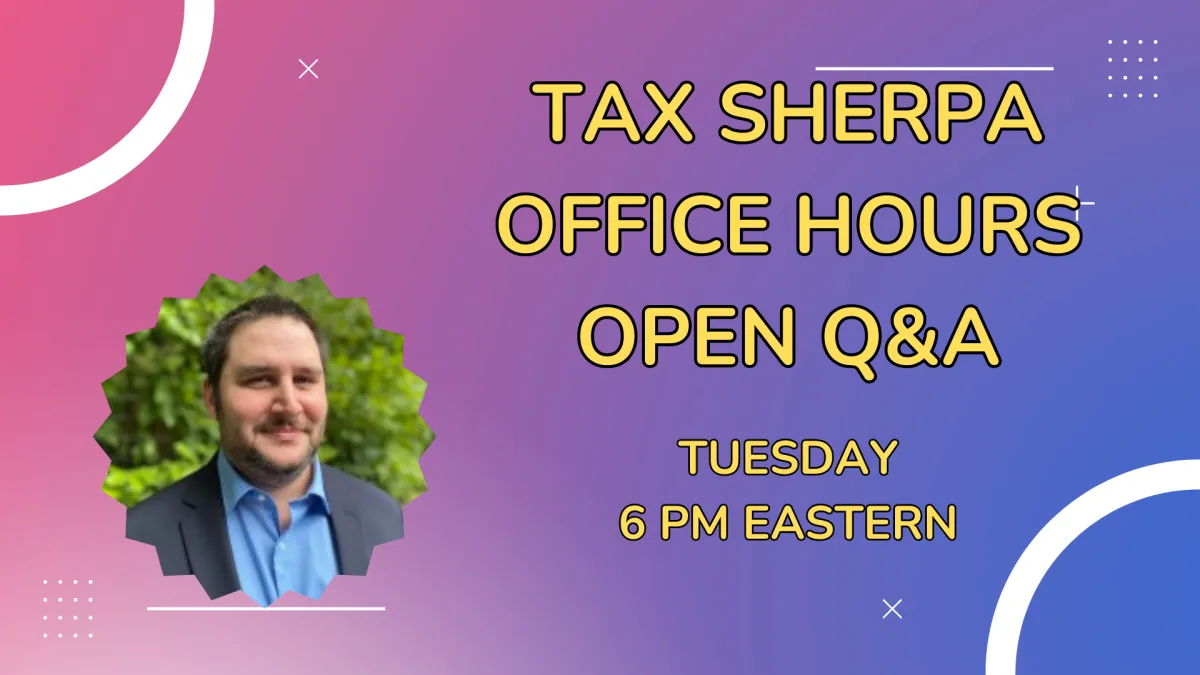Contact Us
office@taxsherpa.com
(678) 944-8367
Follow Us:
Our Blogs
On our blogs you will find our Tax Sherpa Stories series as well as additional posts covering all manner of tax topics. Some items are timely as there are multiple tax filing dates throughout the year and some items are important larger concepts.

Unlock Tax Savings: Essential Strategies | Tax Sherpa Live 2024-07-09
Welcome to Tax Sherpa Live!
In this full episode of Tax Sherpa Live, recorded on July 9, 2024, Neal McSpadden addresses a range of essential tax topics tailored for solopreneurs, small business owners, and independent contractors. This session is rich with valuable insights and actionable advice that can help you optimize your tax strategies and achieve financial freedom.
Key Questions Covered:
1. Effective Tax Planning Strategies for S-Corporations [00:12:45]
Neal explains how S-Corporations can maximize their tax savings through smart structuring, efficient cash management, and salary optimization. Learn about the benefits of Qualified Business Income (QBI) deductions and how to minimize expenses effectively.
Key Quote:
"S-Corp owners can take advantage of QBI deductions to reduce taxable income."
2. Drawbacks of Tax Deferral Strategies [00:19:12]
Discover the potential pitfalls of tax deferral strategies and why it's crucial to understand the long-term implications before committing to them. Neal discusses the hidden risks and future liabilities that can arise from deferring taxes.
Key Quote:
"Deferring taxes can create unexpected future liabilities."
3. Handling IRS Audit Notices [00:24:02]
Neal offers practical advice on responding effectively to IRS audit notices and reducing your audit risk. Learn about the current audit process, the importance of timely responses, and tips to navigate an audit with confidence.
Key Quote:
"Most audits today are correspondence audits, not in-person."
4. Retirement Accounts and Their Tax Implications [00:30:41]
Learn about the tax implications of various retirement accounts and how different plans can affect your taxes. Neal discusses the benefits of traditional vs. Roth IRAs and the importance of choosing the right retirement plan for your financial goals.
Key Quote:
"Maximize your tax savings with the right retirement account choices."
5. Success Stories from Tax Advice [00:35:48]
Neal shares inspiring success stories from clients who have benefited from his tax advice. These stories highlight the significant impact that effective tax planning can have on both financial and emotional well-being.
Key Quote:
"Effective tax planning can relieve significant emotional and financial burdens."
6. Proactive vs. Reactive Tax Planning [00:41:26]
Understand the critical differences between proactive and reactive tax planning. Neal explains why proactive planning is essential for minimizing tax liabilities and achieving financial stability.
Key Quote:
"Proactive tax planning means you control your financial destiny rather than reacting to past events."
7. Unique Tax Strategies for High Net-Worth Clients [00:44:33]
Neal discusses unique tax strategies tailored for high net-worth clients, including specialized tax credits and charitable strategies. Learn how to manage complex financial situations and maximize tax savings with personalized strategies.
Key Quote:
"Understanding the character of income is key to effective tax planning for high net-worth clients."
Join Us Live Next Time!
Don't miss our next live session every Tuesday at 6 PM Eastern. Click the link to register: taxsherpa.com/live
For more resources and to download our DIY Tax Planning Templates, visit: taxsherpa.com/templates
Frequently Asked Questions
Q:
What's the difference between tax advisory and just filing my taxes?
Filing your taxes each year is a necessary task, but it is always backwards looking. Tax advisory works with you throughout the year to make sure that you are on the right track when it comes to your taxes and have strategies in place to save money now.
Q:
I've heard about tax write-offs for small businesses. What exactly can I write off, and how does it benefit my business?
Tax write-offs, also known as tax deductions, are expenses that a business incurs that can be subtracted from its revenue to reduce the amount of taxable income. Common write-offs include office supplies, mileage, rent for a business location, and advertising expenses, among many others. By writing off legitimate business expenses, you can significantly reduce your taxable income, which can lead to a lower tax bill. It's essential, however, to maintain proper records and ensure that the expenses are truly business-related.
Q:
What's the difference between a tax deduction and a tax credit?
A tax deduction reduces the amount of your income that is subject to taxation, which in turn can lower your tax liability. Common deductions include expenses like mortgage interest, student loan interest, and business expenses. A tax credit, on the other hand, is a direct reduction of your tax bill. This means if you owe $1,000 in taxes and have a $200 tax credit, your tax due would be reduced to $800. Some popular credits include the Child Tax Credit, the Earned Income Tax Credit, and credits for energy-efficient home improvements.
Q:
I'm thinking of hiring an independent contractor instead of an employee. Are there different tax implications for each?
Yes, there are significant tax differences between hiring an employee and an independent contractor. When you hire an employee, you're responsible for withholding federal and possibly state income taxes, Social Security, and Medicare taxes from their paychecks. You also typically pay unemployment taxes on wages paid to employees. Independent contractors, on the other hand, are responsible for their own taxes. As a business owner, you'd provide them with a Form 1099-NEC (if you pay them $600 or more during the year) instead of a W-2, and they would be responsible for their own self-employment taxes. It's important to correctly classify your workers, as misclassifying can lead to penalties.
Get in touch with us
Have questions? Use the form here and one of our knowledgable staff will get back to you as soon as possible.
(678) 944-8367
office@taxsherpa.com
2302 Parklake Dr NE Ste 675
Monday - Friday, 10:00 am - 5:00 pm
Send us a message

Follow Us
Follow Us
Disclaimer: The content presented on this website is intended for informational purposes only and is not tailored to the needs of any specific individual or entity. It should not be considered as financial, investment, or tax advice. The information provided is general in nature and does not account for individual circumstances or financial positions. Before making any financial or tax-related decisions, we strongly advise consulting with a qualified professional who can provide guidance tailored to your individual situation. All information on this site is provided in good faith, but we make no representation or warranty of any kind, express or implied, regarding the accuracy, adequacy, validity, reliability, availability, or completeness of any information on the site. Use of this site and reliance on its content is solely at your own risk.
Services
More
Contact Us
office@taxsherpa.com
(678) 944-8367
2302 Parklake Dr NE Ste 675
Atlanta, GA 30345
Monday - Friday, 10:00 am - 5:00 pm
© Copyright 2026. Online Tax Solutions Group LLC dba Tax Sherpa. All rights reserved.
